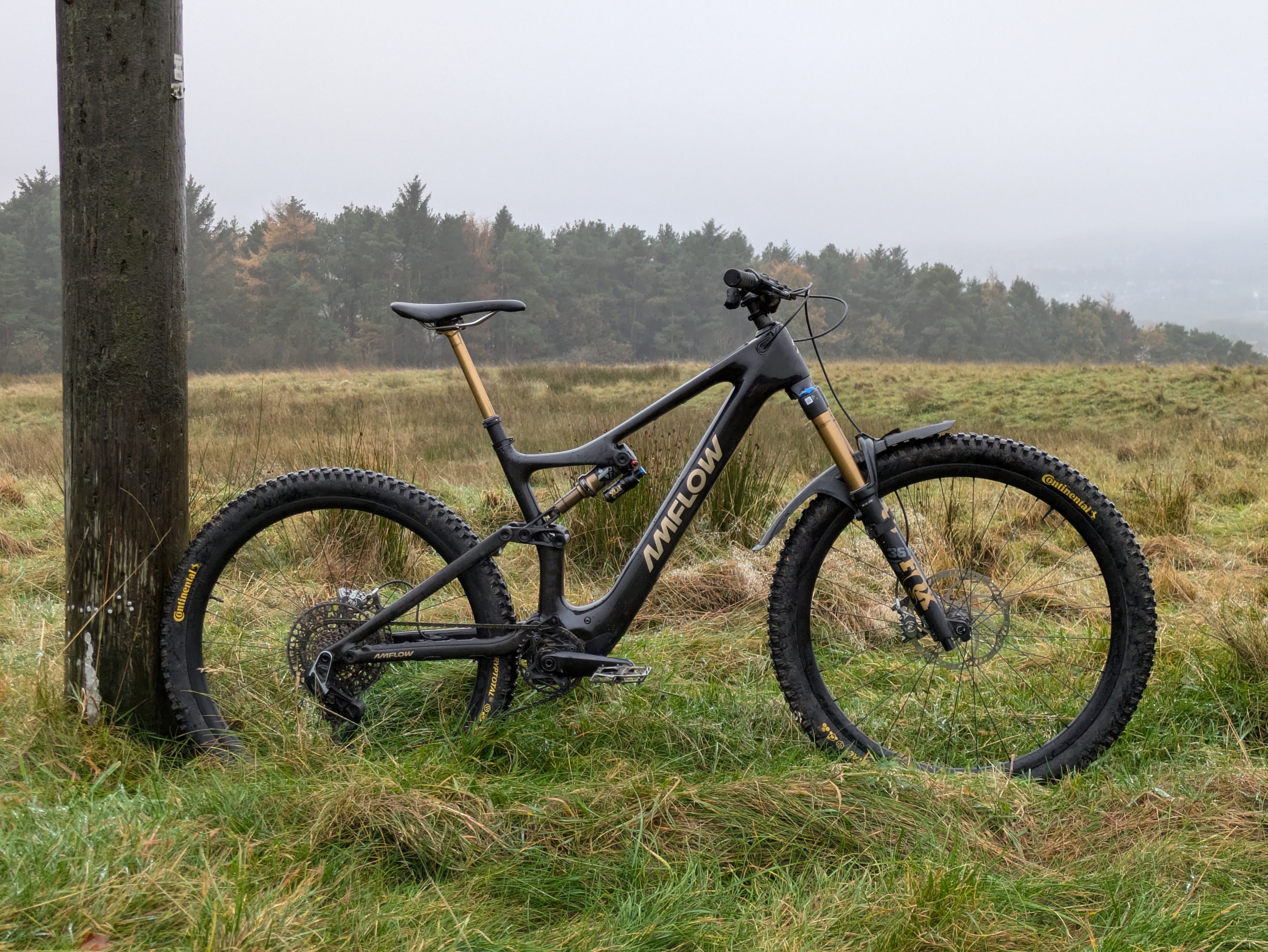“After more riding, I was pretty convinced that this is the best ebike motor out there, and by some margin” – Benji gets blown away for a day by the Amflow PL Carbon Pro.
- Brand: Amflow
- Product: PL Carbon Pro
- From: Amflow Bikes
- Price: £8,999
- Tested by: Benji for a day
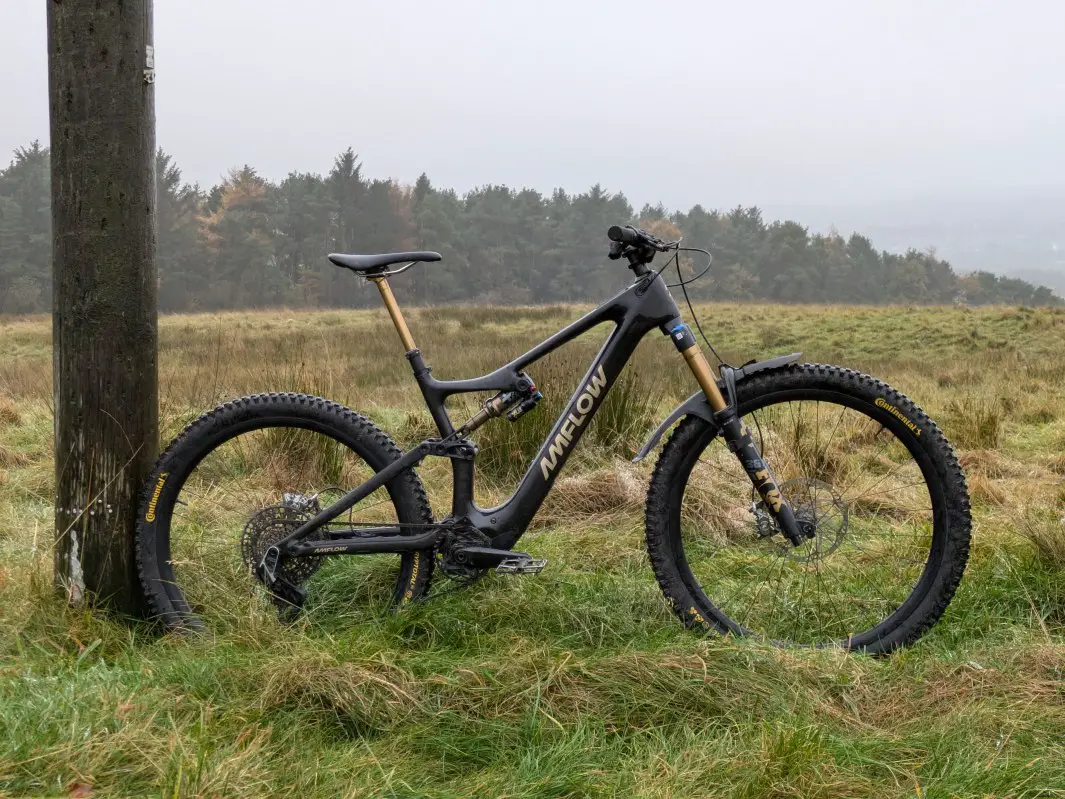
Pros
- Incredible levels of motor-to-rider response
- Decent frame and suspension feel
- And yeah, the power is massive
Cons
- Unknown reliability and after-sales support
- Geometry could be more up to date
- Headline-making power numbers not all that useable on the trail
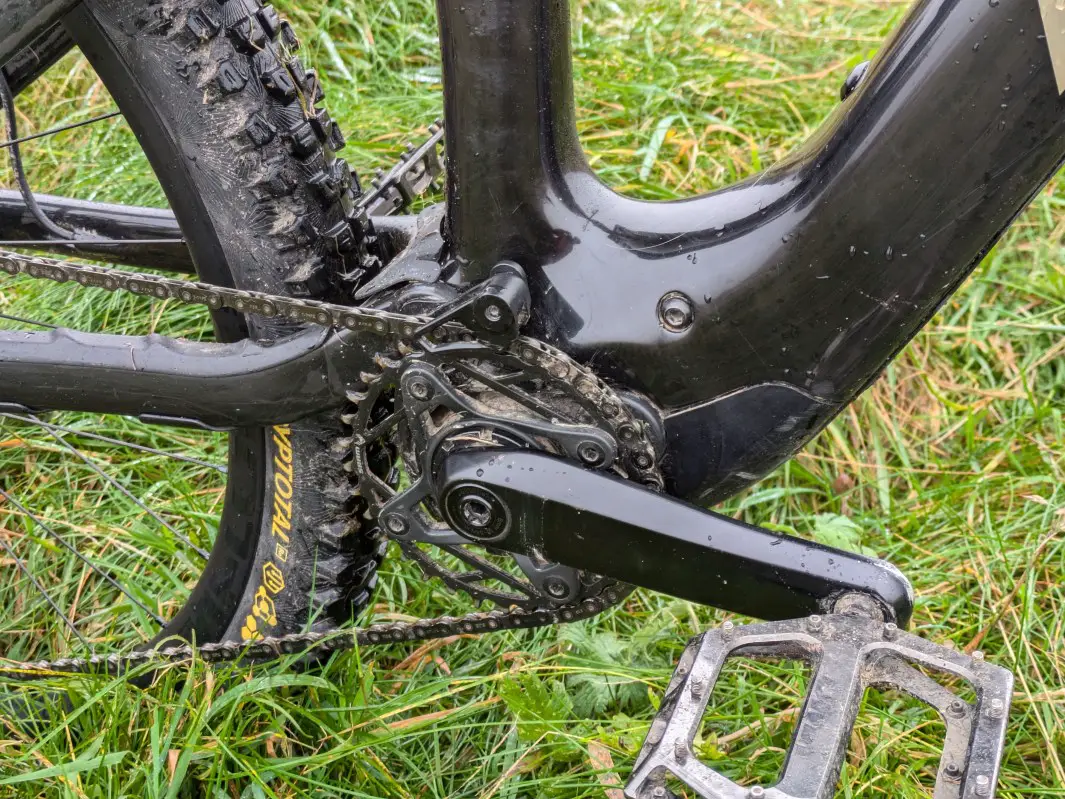
Earlier this year it felt like the bike industry was quite happy being on one timeline and then Amflow/DJI entered the chat with a system seemingly from the future.
It’s fair to say that this bike – or more accurately the hugely powerful DJI Avinox motor it contains – has got a lot of headlines and general punter attention this past few months.
The Amflow aspect of this whole thing has been easily glossed over. Which is understandable; the bike aspect of the deal is almost wilfully discreet and middle-of-the-road. It’s A.N. Other carbon fibre 4-bar bike, in black, with very averaged-out geometry.
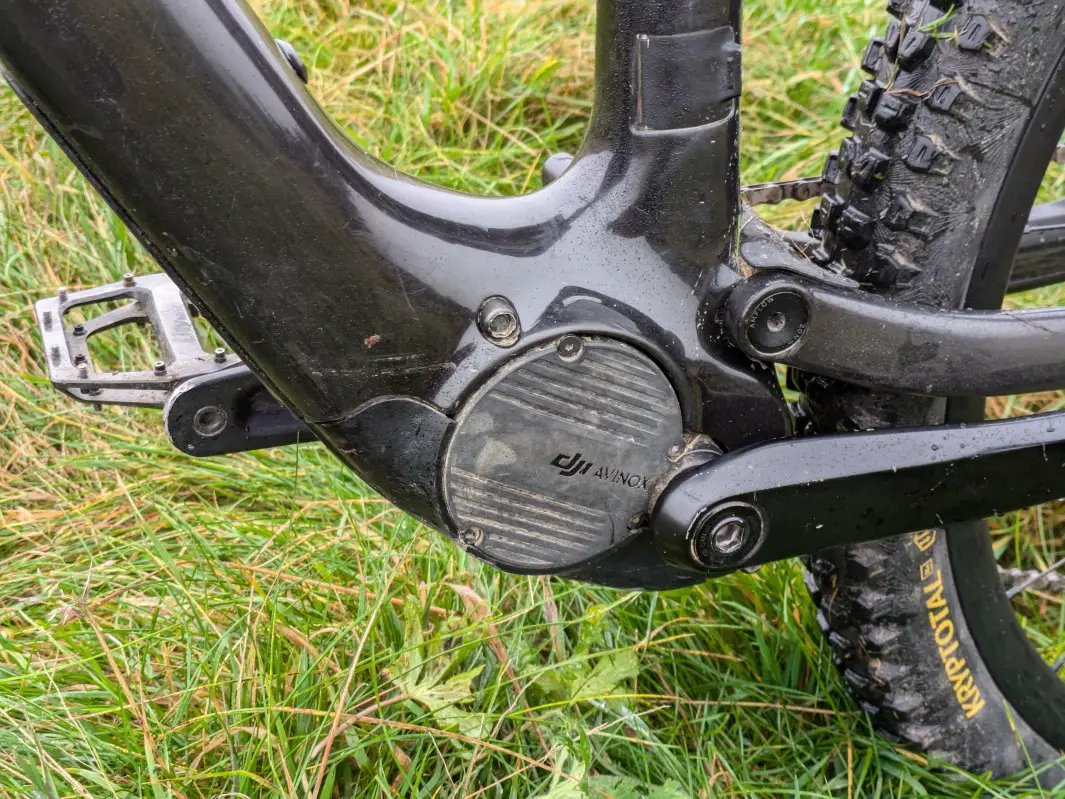
It is most definitely not like the wild ‘n’ wacky styled eMTBs that we see from other non-pushbike brands; am thinking mainly of the often ‘interesting looking’ models from bold and brash motorbike and car brands.
In terms of travel and type of bike, the Amflow has 150mm rear travel, 160mm fork travel and is squarely aimed at the trail bike sector. This is not an E-nduro sled, or even a woodland/bikepark lapper. This bikes is for doing the miles on.
Being the people pleaser that I am, I will go more into the frame and components later on. You clearly want me to get on with the Main Event first the DJI Avinox M1 motor.
Numbers. The power. The battery capacity. The bike weight.
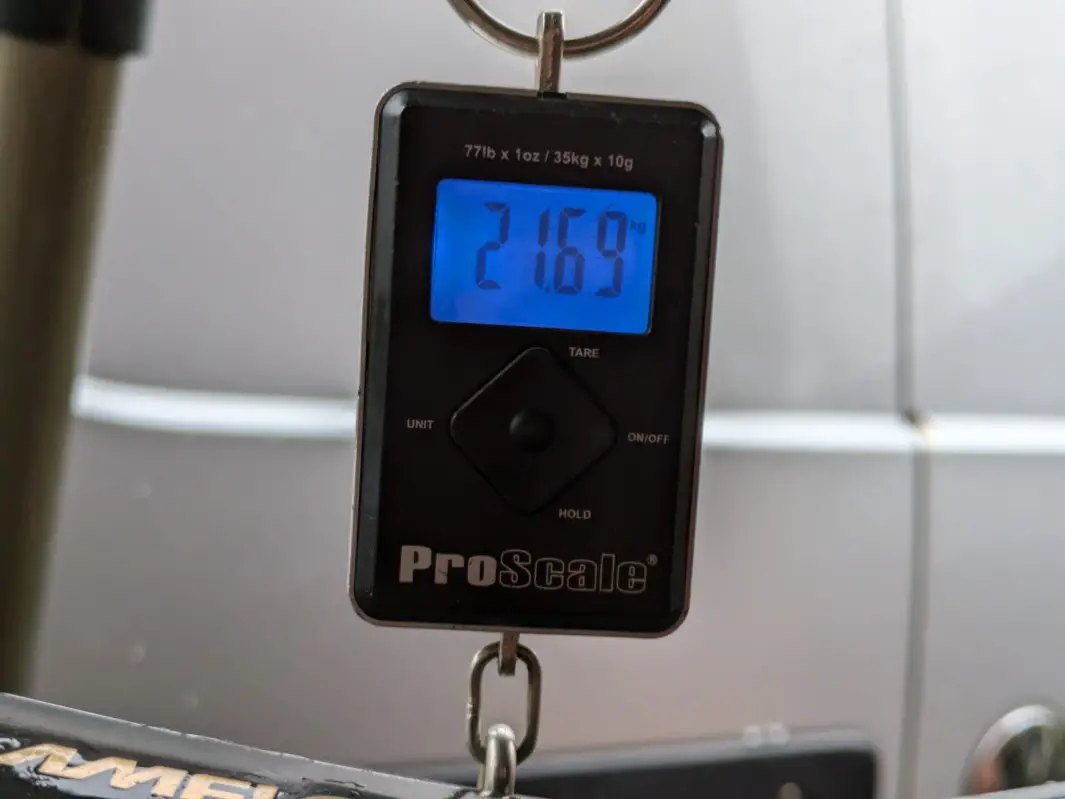
The power: 105Nm of torque. 850 watts of peak power. That’s the top figures for when you’re riding in the regular assist levels (Eco, Trail and Turbo). There is also an Auto setting that goes up and down the Eco-Turbo spectrum as it deems fit according to what it thinks you need at any one time.
There is also a temporary ‘Boost’ level that gives you access to 120Nm of torque and 1,000 watts of peak power for a timed period of 30 seconds. To ‘Boost’ you long-press (half a second) on the ‘+’ button on the left hand bar remote. You can quit the Boost at any point in its timed 30 seconds by pressing any button.
For those of you not au fait with your E numbers, yer typical full-power eMTBs offer around 85Nm of torque and 600 watts of peak power. And that’s with motors that weigh a bit more than the 2.5kg DJI Avinox.
And if we compare the Amflow to some similar weight (circa 20kg) ‘mid-power’ eMTBs from established bike brands – with motors such as the TQ HPR-50, Fazua Ride60, Bosch SX or the Specialized SL2 giving out 50-60Nm of torque – the numbers there are dwarfed by the DJI motor’s muscle.
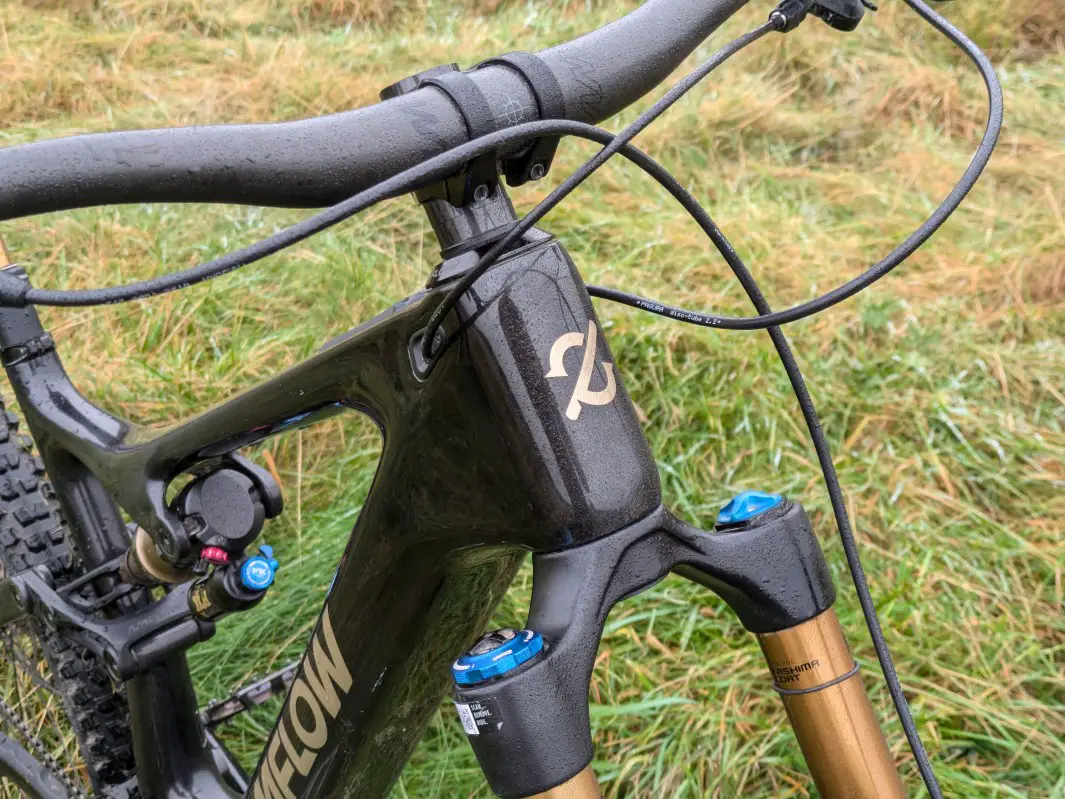
The internal battery is available in two capacities on the top Pro model of the Amflow Carbon PL: 600Wh and 800Wh. I rode the bike with the 3.74kg 800Wh battery, which is internal and not easily removed (you need to remove the motor etc). As is the way with the ebike market, I can’t imagine very many people not going for the biggest battery.
Personally, I think I would have the 2.87kg 600Wh to help keep the ‘kerb weight’ nearer the magic 20kg mark. But then again, I may change my tune in the real world if it was my money/credit card! There are no current plans to offer a range extender battery either. Which is food for thought.
And as mentioned, the lesser priced models only ship with 800Wh batteries anyway. So the choice is out of your hands unless you can stump up the funds for the Pro model.
Overall bike weight. I rode the Amflow Carbon PL Pro with heftier tyres (Continental Kryptotal Super Soft DH), a front mudguard and DMR Vault flat pedals. On my scales, this Large size weighed in at 21.69kg. A 600Wh battery version would have been 20.82kg FWIW. This is pretty close to my ideal bike (of any sort) handling weight of 20kg.
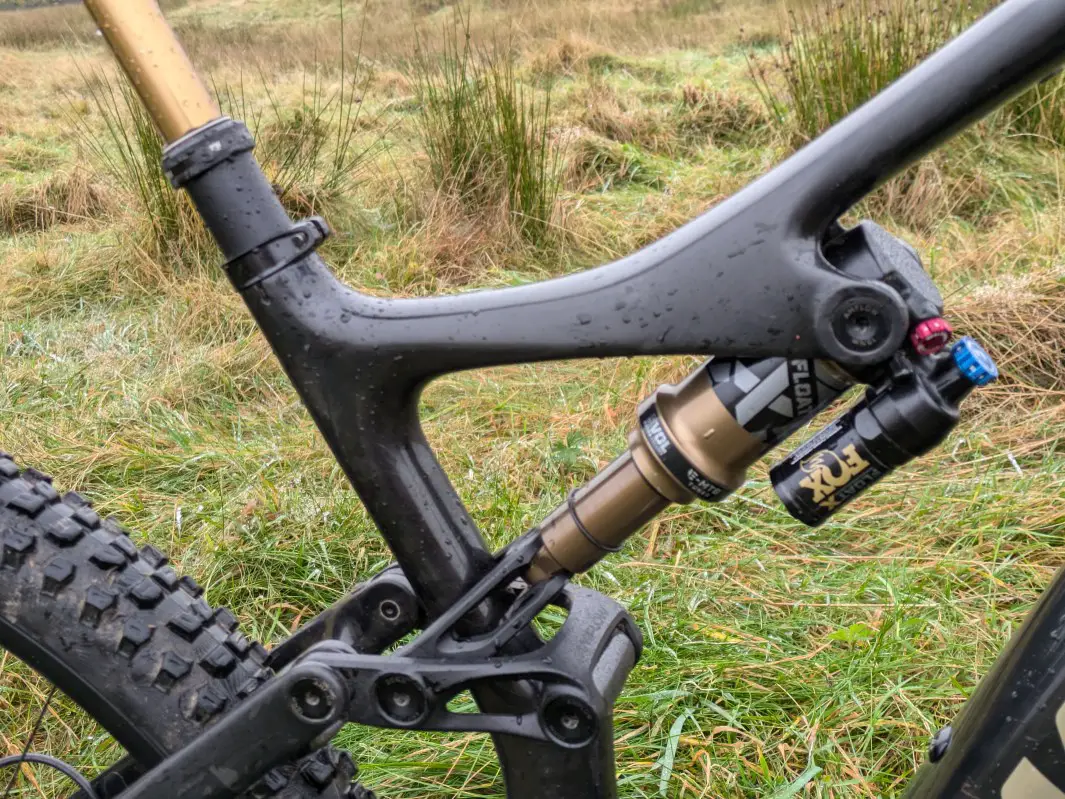
The final part of the ebike system is often where brands come unstuck. The interface. The controls. The smartphone app. There’s a lot of times the user experience can be “nice motor, shame about the display/remote”.
Disclaimer: during my day with the Amflow, I did not try the phone app. So I’m not going to mention it anymore.
In terms of controls and interface, the Amflow scores very highly indeed. Sure, the slightly naff ‘Transformers’ aesthetic to the fonts, and the fairly cringe ‘punch it Chewie’ starburst vibe to the OLED display’s background during the 30 seconds of Boost, isn’t my cup of electric tea. But there’s no denying the intuitive nature of the dual bar remotes (more of that in a minute), the clarity of the OLED and the amount of information on offer.
The 2in OLED display in the top tube is also touchscreen affair. Though I must also confess to not really using it during the test period. Partly because I just was fine using the second bar remote for screen adjusting/scrolling.
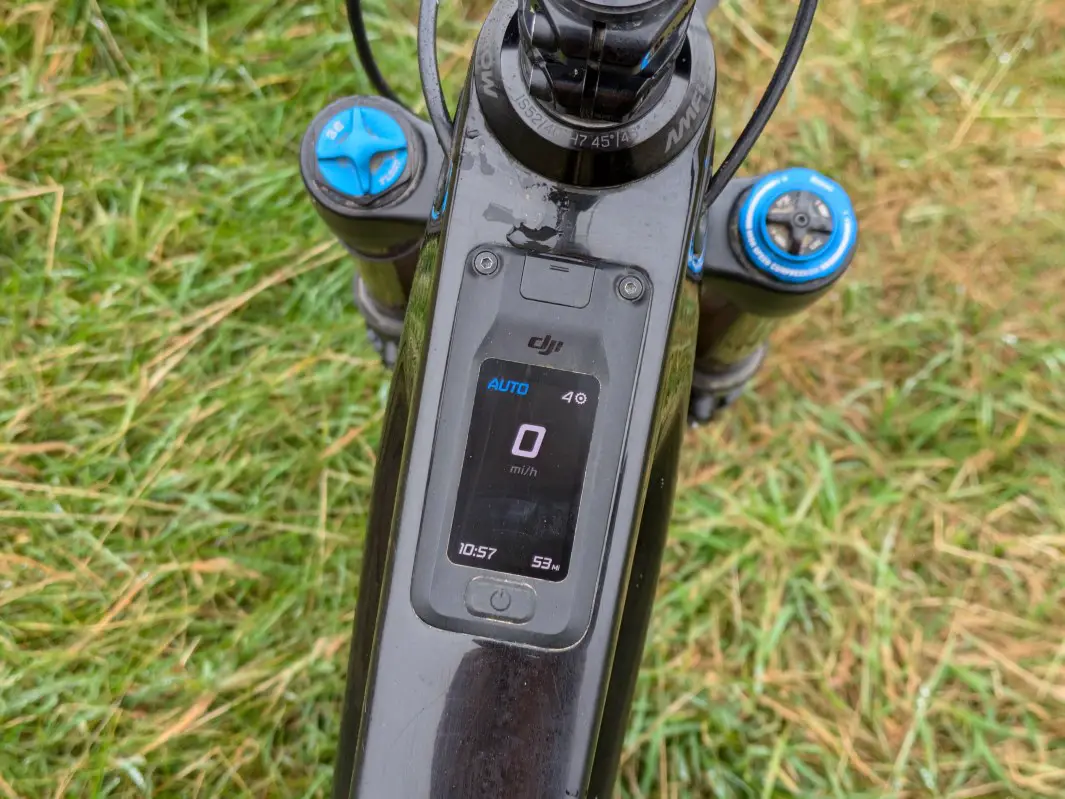
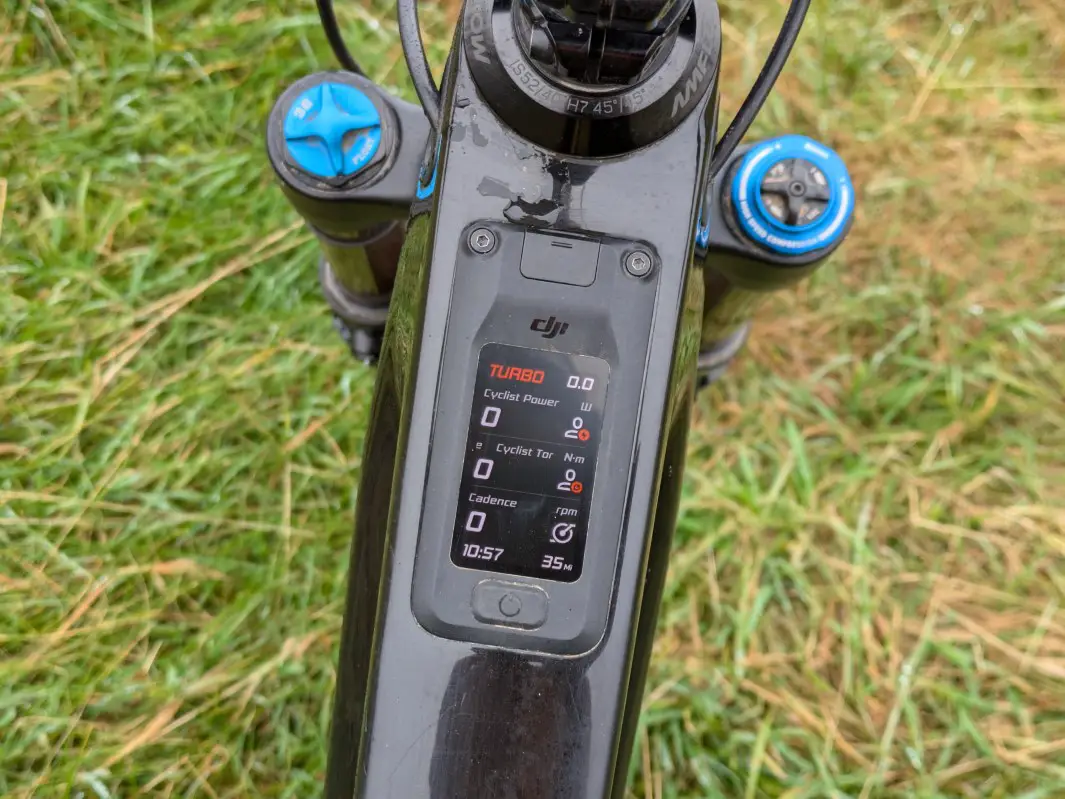
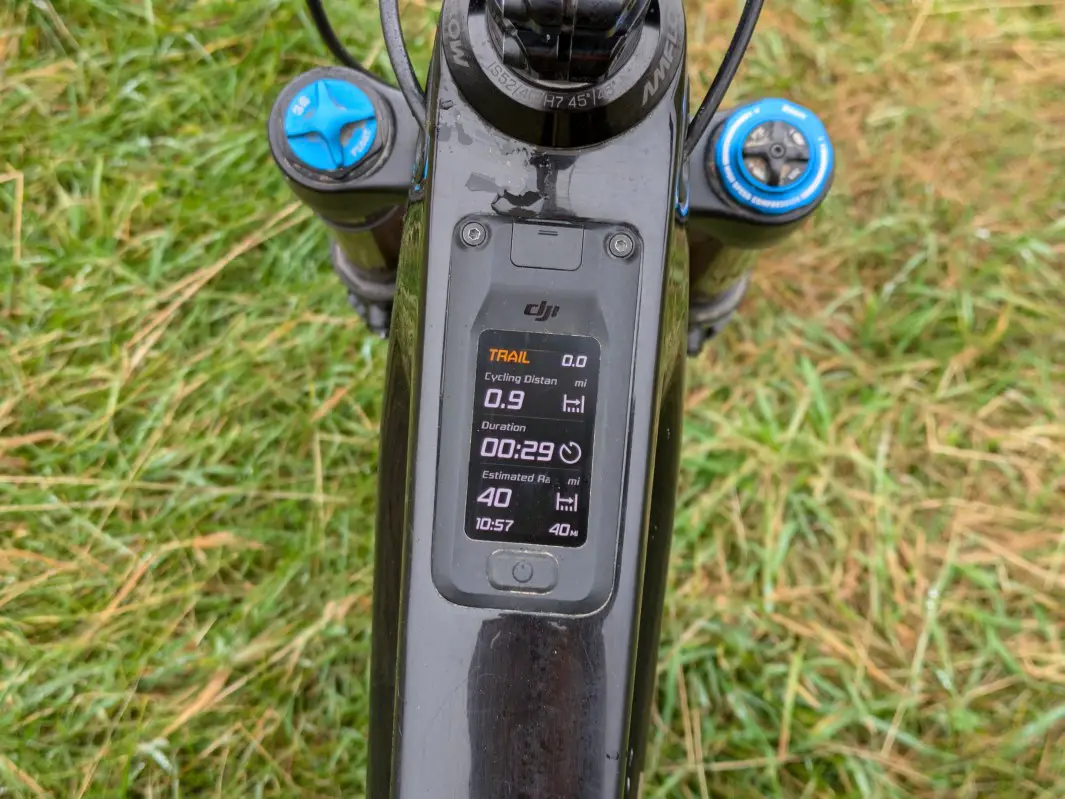
Dual remotes? Yep, there’s a two-button remote adjacent to the left hand grip and also one next to the right hand grip. The left remote does the usual e-bike thing of going up and down the power assist levels via +/- buttons. The right hand remote also has two buttons: the top one scrolls through the OLED display screens, the bottom one can be assigned via the app to do… something. For example, you can use it to start/stop recording on your wirelessly connected DJI action cam.
You can also do without one or even both of the bar remotes (which are wireless Bluetooth by the way) and just use the OLED touchscreen and the physical (on/off) button that sits immediately below it.
One feature I did actively use a lot – much to my surprise – was the Auto assist/power setting. Unlike some other motors’ Auto modes, the DJI Avinox’s Auto wasn’t slow-to-react, nor did it ever noticeably choose an undesirable assist level. I genuinely think if I had this bike, I’d probably just leave it in Auto for 99% of the time. That feature was very impressive.
The DJI stuff on the Amflow essentially does not feel like a tentative first attempt. This is not a suck it and see how it goes operation. This is probably because it is not their first attempt. Although this is the first production bike, there have been something like 11 iterations of the motor (and seven of the Amflow frame) during the whole process up to this point.
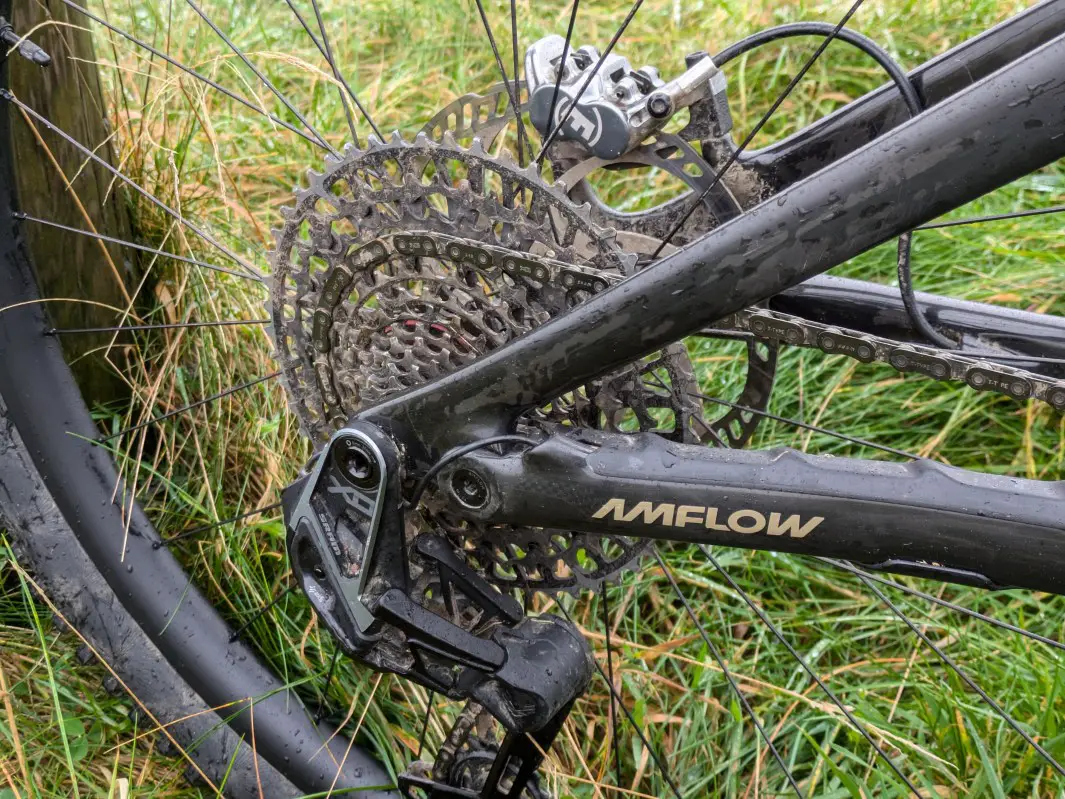
I realise that every ebike motor design team claims that their motor is stuffed with clever sensors doing lots of clever… sensing. But if there was one key takeaway I had from my day with the Amflow it was not the sheer Nm/watts on offer, it was how responsive the motor was. It felt very much like there was a great deal more at play than a speed sensor at the wheel and cadence and torque sensors at the crank.
Amongst the sensors are inertia sensors for acceleration and, intriguingly, a speed sensor on the rear wheel that has 42 points of pick-up (as opposed to the more common single sensor on other e-bikes). It looks a lot like the multi-slotted thin disc you see on Magura’s ABS system.
Essentially the motor knows a heck of lot more about how fast you’re moving as a result of all these sensors (especially the 42 point speed sensor). I think this level of speed information flow was vital in making all of the motor’s power impressively useful.
The Avinox motor knows when to rein it in. You don’t have to second guess when the surge-shoving of the motor will die off; it begins to die away pretty much the instant that your pedaling does. Personally, I immediately found this level of response far more useful (and less sketchy) on steep, technical climbs than the oft-fanfared ‘overrun’ feature of other motors (where the motor keeps the power down for up to 2m after pedal input stops). It was self-evidently a better method when encountering either brand new terrain or trails that are in constant state of change. I find I can only really use overrun when I know what’s coming up. That might just be me though.
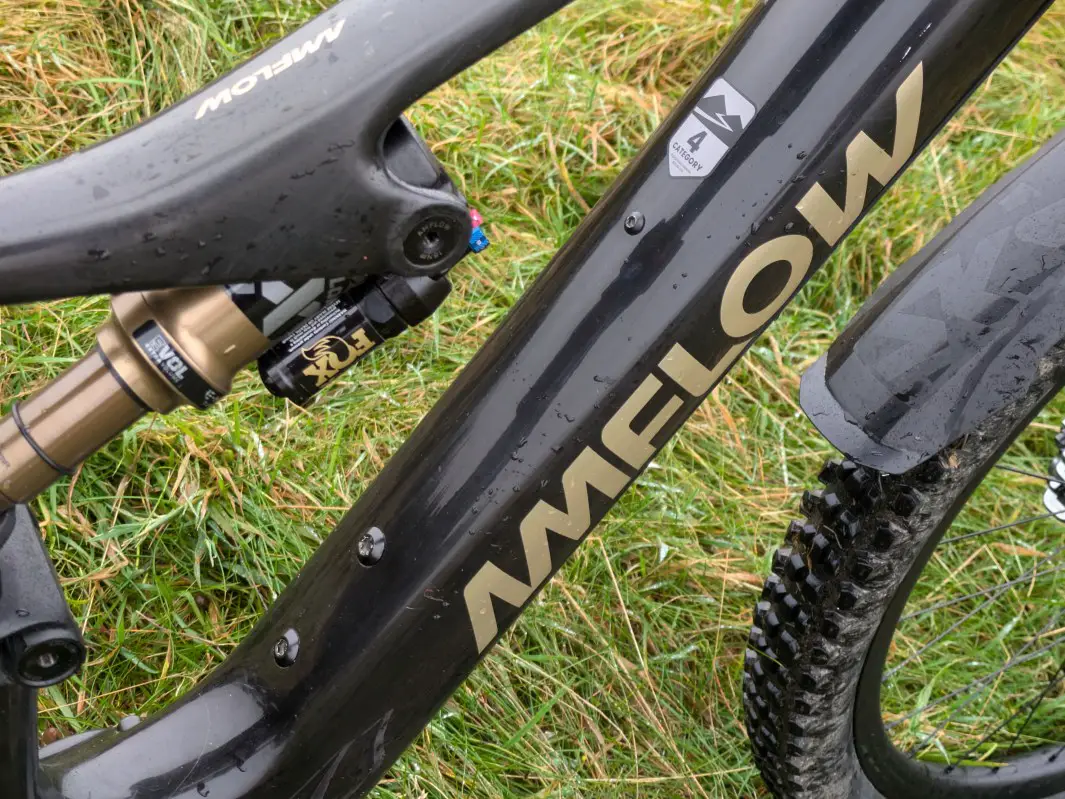
So yeah, the Amflow is already well up there with the best climbing eMTBs available. I’d probably already go as far as saying that the DJI Avinox motor is probably the best climbing motor around. It’s the frame’s geometry that prevents it from being an instant ascending champ. To be brief, the bike could do with a steeper seat angle and (on the larger sizes) longer chainstays for it to be a true e-mountain G.O.A.T.
There’s only so much raw power can do. Eventually the front wheel lifts as your mass falls too far rearward in relation to the rear axle. (And I imagine the specced Maxxis Dissector rear tyre spits traction pretty quick too). There are better steep, technical climbing eMTBs out there with less Nm but more seat angle degrees and chain stay mm.
In terms of the (in)famous Boost mode. I basically couldn’t use it safely on proper terrain ie. singletrack. Just too fast and/or impossible to lay consistent traction down. On roads and fireroads it was a different matter. Genuinely f*cking well fast. But… and it’s a big but, there’s still the 15mph cut-off. And it arrives pretty f*cking fast too.
So yes, you can pretty much do 15mph up any smooth wide-ish track you can find without worrying a three-figure heart rate. In that sense, the motor’s Boost mode is perfect for gravity lappers. But… and it’s another sizeable but, the bike part of this ebike isn’t going to shine at such hot lapz of grrr. It has neither the suspension travel nor the geometry. As stated, it’s a trail bike through and through.
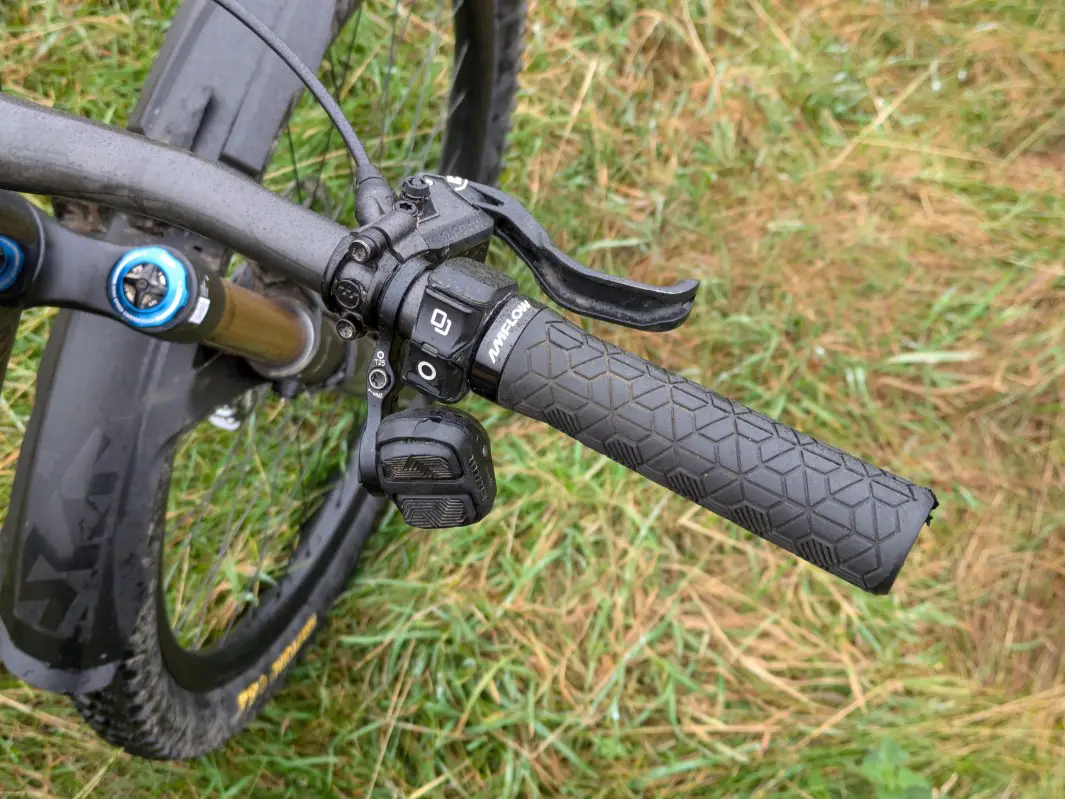
As regards the suspension, I have mostly good things to report. The Fox 36 is a great fork. I prefer it to the Fox 38 in fact (which always ramps up too much for my 73kg). I didn’t even really notice any harshness from the Grip X2 damper but that may have been offset by the well-damped Continental tyres and general squishy terrain.
The rear suspension is a 4-bar design actuating a Fox Float X Factory Evol shock. Although it ostensibly looks like a Specialized, I didn’t feel it rode that much like a Stumpjumper. The Amflow feels much, much more progressive.
It was suggested that I run a healthy amount of sag (35% ish) and I feel that was good advice. It had the double effect of accessing decent amount of travel and remaining calm and grippy, whilst also effectively slackening the head angle and lowering the BB (useful when you’re riding a bike that a shorter reach and wheelbase than you’re used to).
Kudos to Amflow for speccing 155mm cranks (on Medium and Large sizes) by the way. The fact that I didn’t notice them tells you everything about short cranks. The XL and XXL sizes come with 160mm cranks, which is a bit odd. 155s for e-veryone I say.
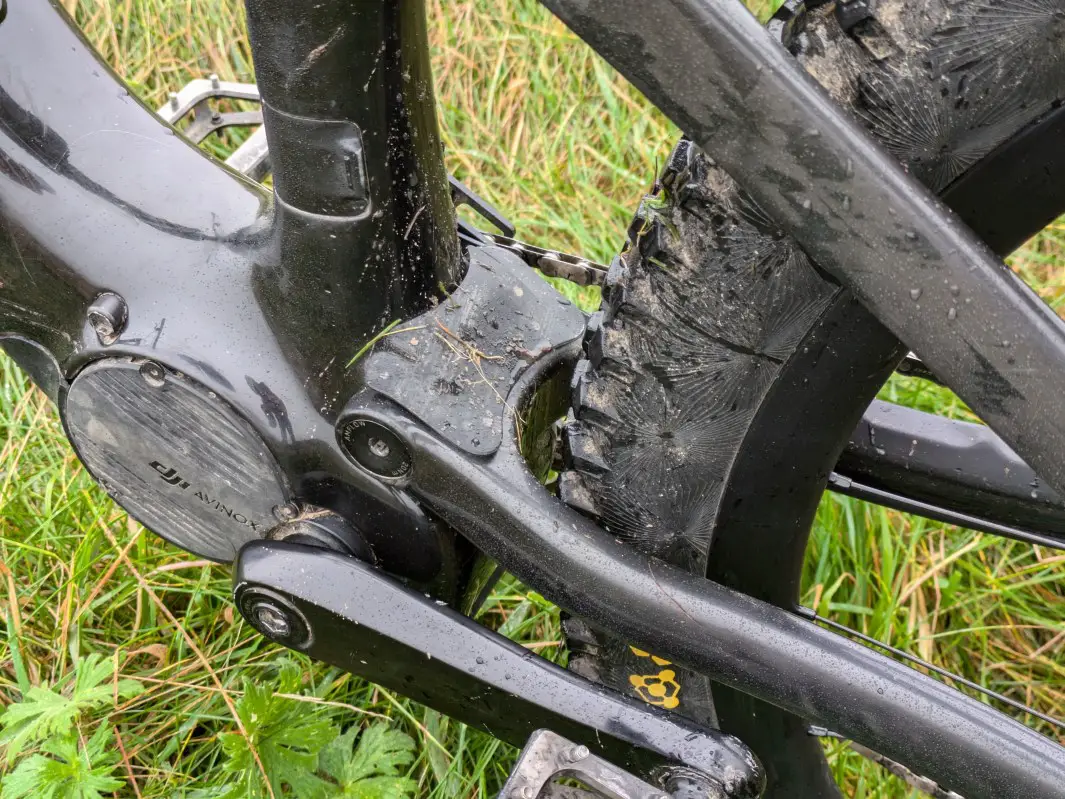
Anything else before I sign off? The motor was not as virtually-silent as a TQ but it was much, much quieter than most full power motors. The battery fuel economy was decent too. I’m not going to say anything more than that at this stage, as a lot more riding is required to accurately assess ‘MPG’ performance. Suffice to say, I’m currently not worried about it. (If anything, it definitely makes me want to try the 600Wh battery version now)
Which leaves us with two elephants in the room.
Will Amflow be available to buy in the USA, now that DJI is on the US Department of Commerce’s Entity List, which classifies the Chinese company as a national security concern? Well, apparently Amflow are still intending to sell e-bikes in 2025 (the Entity List does not mean a ban on sales, it’s more of a limit of US exports, re-exports and transfers to DJI).
And there’s the big question of reliability and after-sales support. I, obviously, cannot say much of anything about either at this point.
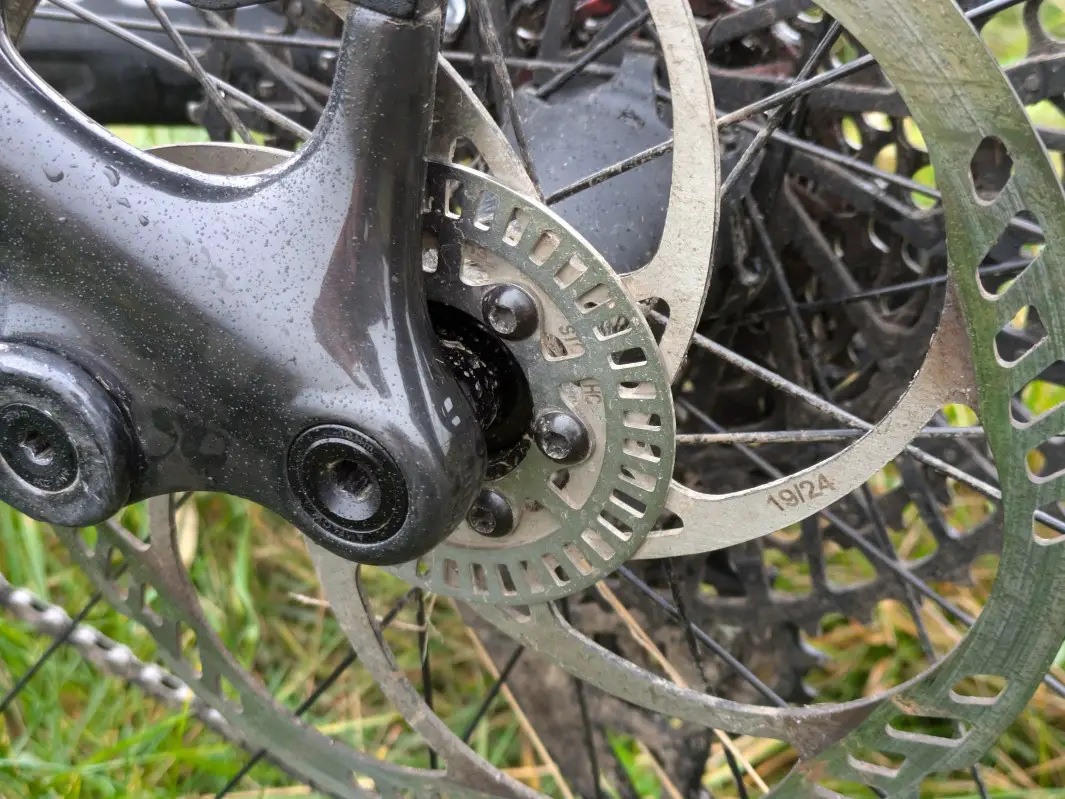
Overall
All in all, I will just come out and unashamedly say I had loads of fun on the Amflow PL Carbon Pro. The DJI Avinox motor really is everything it’s cracked up to be. The Boost-ed numbers turned out to be not that relevant to trail riding in my opinion, but the unparalleled level of responsiveness and intuitive control of the rest of it was stunning.
It took less than half an hour of proper mountain biking for all of my cynicism to be exploded away. After a few more hours of riding, I was pretty convinced that this is the best ebike motor out there, and by some margin. I was a bit less convinced by the ‘strictly trail bike’ remit of the bike but if Amflow can tweak some geometry numbers (and/or introduce some flippy-chippy geo adjustment), this thing would be unbeatable.
Any questions?
Leave a comment below. I’ll do my best to answer them – or find out the answer!
Amflow PL Carbon Pro Specification
- Frame // Carbon, 150mm
- Shock // Fox Float X Factory Evol, 185x55mm Trunnion
- Fork // FOX 36 Float Factory Grip X2, 160mm
- Wheels // Amflow HMC-30
- Front tyre // Maxxis Assegai, EXO+, 3C MaxxTerra 29×2.5in*
- Rear tyre // Maxxis Dissector, 3C MaxxTerra, 29×2.4in*
- Chainset // DJI Avinox SL Crank, 155mm, 34T
- Drivetrain // SRAM Eagle X0 AXS Transmission, 10-52T
- Brakes // Magura MT7 Pro, 203/203mm
- Stem // Amflow Enduro Stem One-piece CNC, 35mm, 35mm
- Bars // Amflow Enduro Carbon Handlebar 35, 800x25mm, 9° x 5°
- Grips // Amflow Enduro Lock-on
- Seatpost // Fox Transfer Factory, 155-180mm
- Saddle // Ergon SM Pro
- Bottom Bracket // DJI
- Motor // DJI Avinox M1, 105Nm (30 secs Boost at 120Nm)
- Battery // 800Wh tested
- Size tested // L
- Sizes available // M, L, XL, XXL
- Weight // 21.69kg (‘kerb weight’ as tested with *Continental Kryptotal Supersoft DH tyres, DMR Vault pedals and mudguard)
Geometry of our size L
- Head angle // 64.5°
- Effective seat angle // 77°
- Seat tube length // 450mm
- Head tube length // 115mm
- Effective top tube // 620mm
- BB height // 29mm BB drop
- Reach // 475mm
- Chainstay // 445mm
- Wheelbase // 1,255mm
More Reviews
Top Rated
New STW Merch Arrivals
More sizes – More colours – More choices
-
Gift Card
Select options -
Issue 164
£10.00 -
STW Hold My Mug
£14.99 -
Singletrack Bobble
£26.00
Over 80% of our range is organic and sustainably produced. All our merch sales help support the future of Singletrack in these very challenging times for the cycling media. Our subscribers get the best deals and always get free postage. Not a subscriber yet? Join us today.
Click the buttons to view size and colour options.

